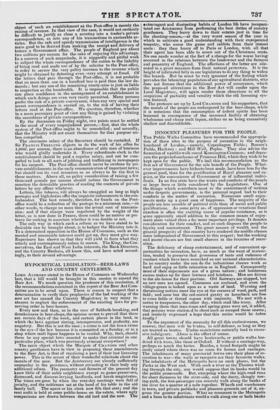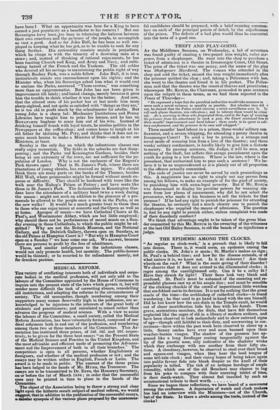INNOCENT PLEASURES FOR THE PEOPLE.
THE Public 'Walks Committee have recommended the appropria- tion of three sites to the purpose of recreation in the neigh- bourhood of London,—namely, Copenhagen Fields ; Bonner's Fields, Hackney ; and Mill Wall, Poplar. They also advise the formation of a pu hi ic walk round Kennington Common ; and depre- cate the projected enclosure of Primrose Hill, which they wish to be kept open for the public. We hail this recommendation as the first act of Government for the sole benefit of the People. What- ever improvements have hitherto been made, have been less for the general good, than for the gratification of Royal pleasure and ca- price, or the convenience of Government or of influential indivi- duals. In no free state have the wants and comforts of the people at large been so little considered by the Legislature. One of the things which contribute most to the contentment of nations under despotic governments, is the paternal regard had to their comforts in the matter of recreation. Numerous small enjoy- ments make up a great sum of happiness. The majority of the people are less sensible of political evils than of social and public gratifications. As some petty act, of oppression or vexatious fiscal exaction is often the exciting cause of popular resistance, so is some apparently small addition to the common means of enjoy- ment more valued than a far more important privilege. It denotes consideration for their comfort, and as such disposes the people to loyalty and contentment. The great masses of wealth and the general prosperity of this country have rendered the middle classes more independent of Government in this respect; but the working and poorer classes are but small sharers in the luxuries of recre- ation.
The deficiency of cheap entertainment, and of convenient op- portunities for recreation, have, as much as the want of instruc- tion, tended to preserve that grossness of taste and rudeness of conduct which have been remarked as our national characteristics. In no country under the sun do the industrious classes work so hard and enjoy so little relaxation as in England. Consequently most of their enjoyments are of a gross nature ; and boisterous excess makes up for their fewness and briefness. Men are driven to the ale-house for their pastime. Old footways are stopped, but no new ones are opened. Commons are enclosed, and even the village-green is looked upon as a waste of land. Warning and threatening notices meet the eye at the corners of wood, park, and field; and none but the red-coated gentry on horseback are free to cross fields or thread copses with impunity. We met with a notice to trespassers, the other day, which read like irony. After warning them that man-traps and spring-guns were set, it added, that persons were stationed to shoot such as escaped those snares; and tenderly expressed a hope that this notice would be taken kindly ! To the argument of the necessity for all this exclusiveness, we answer, that men will be b7utes, in self-defence, so long as they are treated as brutes. Undue restrictions naturally lead to exces- sive indulgence. Abuse is the effect of unuse. All great towns should have boulevards, or public walks bor- dered with trees, like those at Oxford. If without a carriage-way, perhaps so much the better. Besides, a broad footpath might be easily raised where there was no room for horses and carriages. The inhabitants of many provincial towns owe their place of re- creation to war—the walls or ramparts are their favourite walks. The inhabitants of the Metropolis have no such places, but the Parks at the West end. With such a river as the Thames wind- ing through the city, one would suppose that its banks would be the public promenade. But, excepting where the high-road runs for short distances by the river-side, and the dusty, shingly tow ing-path, the foot-passenger can scarcely walk along the banks of the river for a quarter of a mile together. Wharfs and warehouses in town, and private paddocks and pleasure-grounds out of it, en- gross the greater portion. What an ornament to the Metropolis and a boon to its inhabitants would a walk along one or both banks have been 1 What an opportunity was here for a King to have earned a just popularity as a benefactor to his country ! But our.
Sovereigns have been too busy in trimming the balance between their own exactions and the patience of the people, to accomplish so vast a good. And as for John Bull, he has been so well em- ployed in keeping what he has got, as to be unable to seek for any thing further. His nationality consists mainly in prejudices, which he clings to with the tenacity of a drowning man at a straw ; and, instead of thinking of rational enjoyments, he has been toasting Church and King, and Army and Navy, and culti- vating hatred of the French and the Yankees. The old cobler who devoted all his savings to maintaining the public right of way through Bushey Park, was a noble fellow. John Bull, it is true, instinctively resists any encroachment upon his rights; and the Minister who, when his Sovereign asked him what it would cost to enclose the Parks, answered " Three crowns," was something more than an epigrammatist. But John has not been given to improvement till lately; and hated change, merely because it gave him the trouble to think whether it was for the better. And now, that the altered state of his pocket has at last made him more sharp-sighted, and not quite so satisfied with "things as they are," he is too old to profit much by the schoolmaster for adults. But young John is a sharp lad: Mechanics' Institutions and Penny Libraries have taught him to prize his leisure, and he has no BONAPARTE bugbear to scare him out of his wits. Instead of drinking himself drunk with loyal toasts, he studies politics in the Newspapers at the coffee-shop; and comes home to laugh at his old father for idolizing Mr. Pier, and thinks that it does not re- quire much brains to make a Minister of State—such as we see Ministers, at least.
Sunday is the only day on which the industrious classes can really enjoy recreation. The fields in the suburbs are fast disap- pearing; and the Parks and Kensington Gardens, besides their being at one extremity of the town, are not sufficient for the po- pulation of London. Why is not the enclosure of the Regent's Park thrown open? That in St. James's Park, where there are plantations of young shrubs, has received no injury. We should think there are many parts on the banks of the Thames, besides Mill Wall, where promenades might be formed without much ex- pense or difficulty. They should be bordered with trees like the walk near the Bishop's Palace at Putney ; and have seats like those in St. James's Park. The fashionables in Kensington Gar- dens have the attendance of a military band twice a week during the season : might not such an addition to the pleasure of a pro- menade be allowed to the people once a week in the Parks, or on the new walks? It would be a much greater treat to them than to those who can enjoy music at concerts and the Opera as well as at home. Apropos of music—we have Cathedral Choirs at St. Paul's, and Westminster Abbey, which are but little employed; why should there not be performances of sacred music on a Sun- day evening in those Cathedrals, to which the public might be ad- mitted ? Why are not the British Museum, and the National Gallery, and the Dulwich Gallery, thrown open on Sundays, as the old Palace at Hampton Court is? "But why is Hampton Court ern on a Sunday ?" we hear some one ask. We answer, because there are persons to profit by the fees of admittance. These, and similar indulgences to the industrious classes, would not only promote health, but morality. The public-houses would be thinned; or be resorted to for refreshment merely, not far drunken pastime.

























 Previous page
Previous page